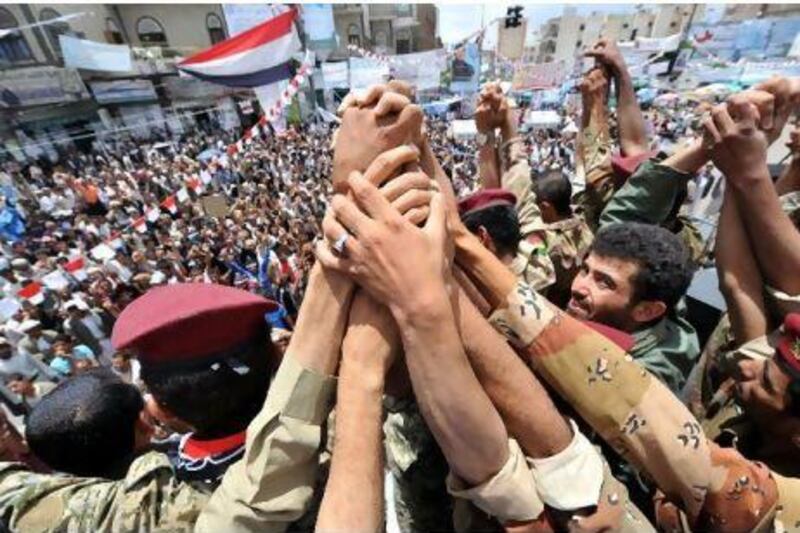WASHINGTON // As the fighting in Yemen finds its way to the narrow streets of Sana'a, it is becoming increasingly unlikely that Ali Abdullah Saleh, Yemen's president, will yield to international attempts to ease him from power.
Instead, a period of increased instability now seems certain until what has become an internal regime struggle is settled.
Should that struggle go on too long, however, chances of all-out civil war will increase, and with it concerns over regional stability. And while regional and international actors are doing their utmost to avoid such a scenario, the ability of outsiders to have any effect on Yemen's fractious political landscape is limited.
This is despite the fact that Gulf, US and international interests are closely aligned in Yemen. Each day some three million barrels of oil pass through Bab el Mandeb, a strategic waterway linking the Red Sea and the Gulf of Aden at the southern tip of the country. With Somalia on the other side, instability in Yemen could seriously disrupt shipping through the strait and affect global oil prices and supply.
Washington's concerns over the ability of al Qa'eda in the Arabian Peninsula (AQAP) to exploit any power vacuum in Yemen are not shared by other powers in the region, who say the group is not powerful enough to pose a serious threat.
Nevertheless, should the authority of a traditionally weak central government wane even further, the many local players in Yemen - secessionists in the South, Houthis in the north, as well as extremist militants - will start to assert their independence from Sana'a.
This fracturing will be of great concern to Saudi Arabia, which shares an 1,800-kilometre-long border with Yemen.
On Wednesday, the White House announced that John Brennan, counter-terrorism adviser to Barack Obama, the US president, has been dispatched to the region, where he will visit Saudi Arabia and the UAE in the coming days. Mr Brennan's arrival is a sign of growing concern in Washington over the situation. The announcement was accompanied by yet another strong US statement of support for the Gulf Co-operation Council (GCC) proposal for a transition of power. The recent fighting, the White House said, underscored the need for Mr Saleh to sign the proposal and "begin the transfer of power immediately".
The GCC proposal calls on Mr Saleh to step down in 30 days in return for immunity from prosecution, and a transitional government made up of opposition parties to hold presidential elections two months later.
But Mr Saleh has stubbornly resisted the GCC's mediation. Three times he has agreed to sign the proposal only to renege at the last moment. However closely the Gulf and the US may co-ordinate over Yemen, this suggests that the success of any international involvement largely depends on domestic Yemeni factors.
Dr Roby Barrett, a Gulf security expert and a scholar with the Middle East Institute, a Washington-based think-tank, said: "To those on the outside, the GCC proposal is what looks reasonable. But for 30 years, Saleh has done whatever Saleh thinks is good for Saleh."
Dr Barrett, who will be speaking at a conference on Gulf security at the Emirates Centre for Strategic Studies and Research later this month, pointed out that Mr Saleh had proven adept at navigating the choppy waters of Yemeni politics. And in these waters the calculations are different.
Much will depend on how the fighting pans out between fighters loyal to Sheikh Sadeq al Ahmar, head of the Hashed tribal federation from which many of Yemen's past leaders have hailed, and the elements in Yemen's army still loyal to Mr Saleh and his sons.
Dr Barrett described that fighting as a "civil war within the ruling regime". Both parties to the fighting have benefited greatly from the make-up of the Yemeni government. Both sides would be aware that should fighting be protracted, the accompanying contraction of central control could open the door to the many other actors in Yemen.
That raises the possibility that both sides might consider an eventual compromise that sees Mr Saleh retain his role.
Central authority is "going to contract" in Yemen, said Dr Barrett, pointing out that such an event is a matter of degree in a country where central authority has at best waxed and waned.
"But they may decide it contracts less with a compromise than it does if they carry this through to the end," he said.
Chances are that Yemenis will eventually return to the GCC proposal or something similar. For all his mastery of domestic politics, Mr Saleh is still facing a broad if highly unstable domestic opposition and near unanimous international and regional calls for him to step down.
It is not clear whether more reform-minded Yemenis, inspired by events elsewhere in the Middle East and North Africa, would accept a regime compromise if such should be reached. As things stand, this is still an unlikely outcome.
Meanwhile, at least a limited fracturing of Yemen is likely as the regime fights itself.





